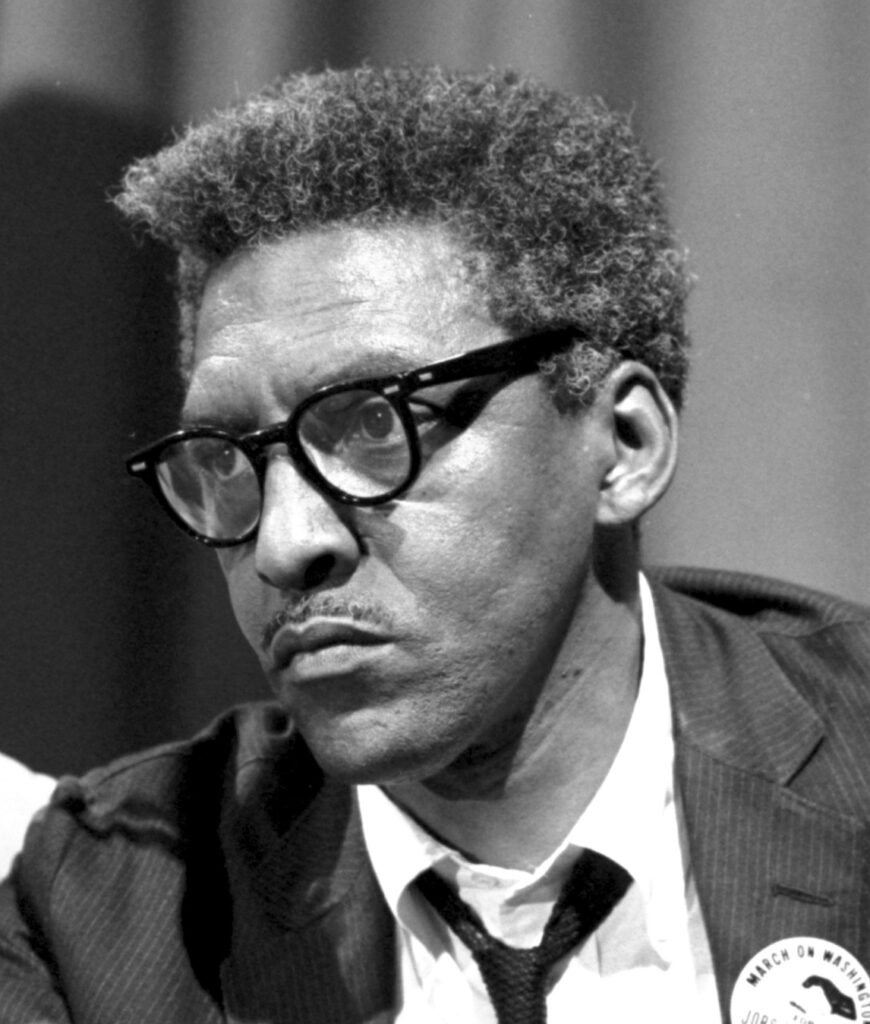By Puneet Cheema, Staff Attorney
Bayard Rustin, the openly gay labor organizer who eventually served as advisor to Reverend Martin Luther King Jr. and architect of the 1963 March on Washington, was a civil rights icon and hero to LGBTQ and Black communities in the United States. Earlier this week, he was posthumously pardoned by California’s Governor Gavin Newsom for a 1953 charge of “vagrancy” for having consensual sex with other men, which resulted in a criminal conviction, 50 days of jail time, and having to register as a sex offender.
As the Governor acknowledged, Mr. Rustin’s charge was one that was frequently used to criminalize gay men for engaging in consensual adult sex at the time. Laws explicitly targeting LGBTQ people’s existence and relationships were commonplace in 1953 (this may also sound familiar today), as was the discriminatory enforcement of vagrancy and other charges.
Lambda Legal applauds the Governor for responding to the California Legislative Black and LGBTQ Caucuses’ request to pardon Mr. Rustin, and recognizing that his “conviction is part of a long and reprehensible history of criminal prohibitions on the very existence of LGBTQ people and their intimate associations and relationships.” It is also commendable that the Governor is not only pardoning Mr. Rustin, but also creating a clemency initiative to pardon others who, like Mr. Rustin, have been subjected to harassment, arrests and prosecution for being who they are. The recognition that this abusive treatment was (and is) wrong and harmful is significant.
But these wrongful arrests continue today. While the LGBTQ rights movement has made significant progress since Mr. Rustin’s arrest in 1953, it is still routine for police departments – particularly Vice units – around the country to waste their resources by targeting gay men in stings and arresting them under charges of lewd conduct, continuing to stigmatize and criminalize them, and denying them the equal protection to which everyone is entitled.
For years, Lambda Legal and our partners have been fighting in the courts across the country against police stings that unfairly target gay men. In 2012, we filed a brief in Palm Springs, CA asking a Superior Court to reverse the convictions of gay men arrested in an antigay sting operation. In 2016, a Superior Court judge in Los Angeles County found that Long Beach Police Department officers “deliberately singled out” gay men for arrest “on the basis of their sexuality,” and lied in their police reports about it. In 2017, five men filed a class action lawsuit against the San Jose Police Department, alleging they had been targeted in sting operations. The judge found the sting operations to be discriminatory and dismissed the lewd conduct charges against the men. In Washington DC in 2018 and 2019, the US Park Police reportedly targeted and arrested gay men for intimate conduct in sting-related operations.
Pardoning gay men who have been targeted after they have already been arrested, prosecuted, and convicted doesn’t erase the violence and long-term psychological, economic, and health consequences that come with being unjustly entangled in the criminal legal system – both for them and their families. It also doesn’t prevent officers from committing the same wrongful and discriminatory arrests, again, to others.
In addition to a program pardoning those who have been harmed by these arrests and unfair criminal records, more must be done by progressive state administrations with oversight powers to ensure that police departments within their jurisdictions do not exercise or abuse their powers in a discriminatory manner at the outset. The California Attorney General should provide guidance to police departments about the discriminatory nature of targeting gay men through stings, and should also use his authority under California Civil Code Section 52.3 to investigate departments that engage in a pattern or practice of targeted arrests against LGBTQ people.
While Mr. Rustin’s pardon and this clemency initiative are critical steps both to fully honoring a national hero and to addressing the discriminatory policing of LGBTQ people, more must be done to prevent these arrests – both in California and around the country – from occurring in the first place.

